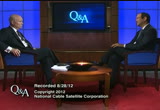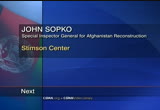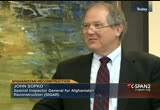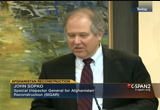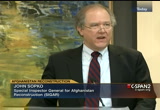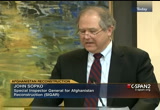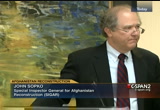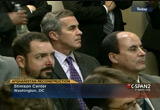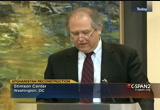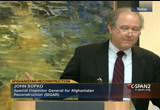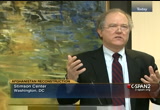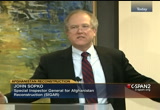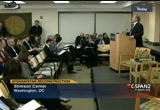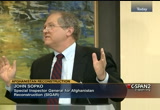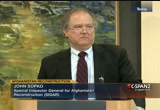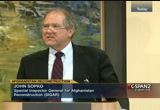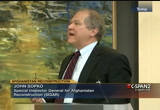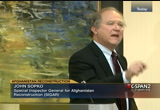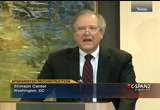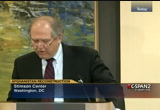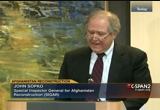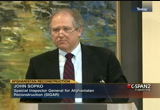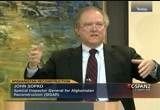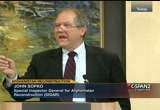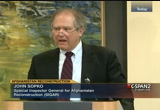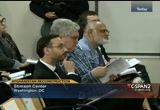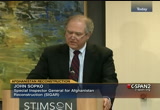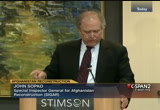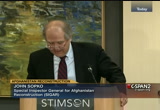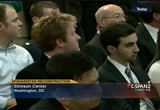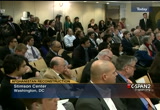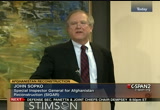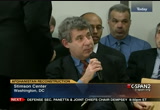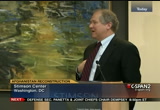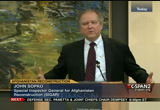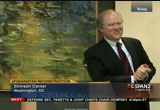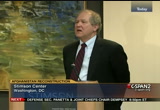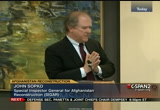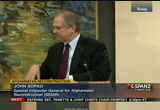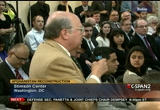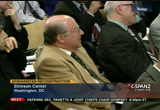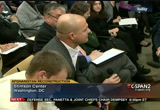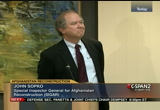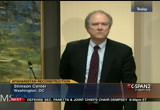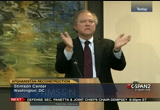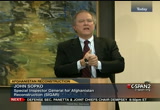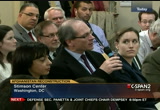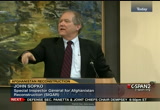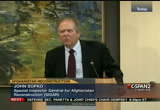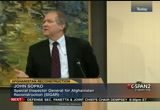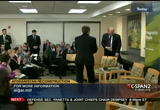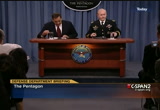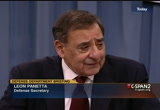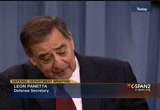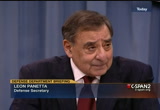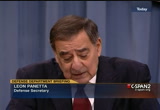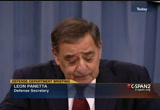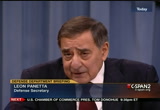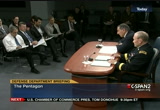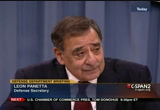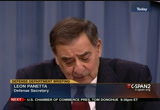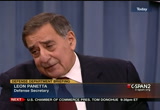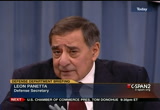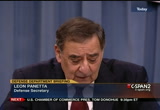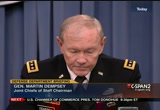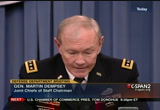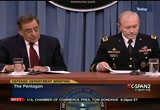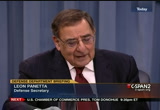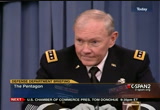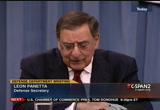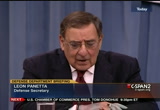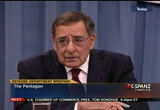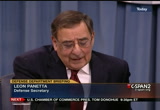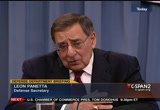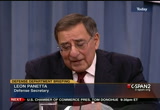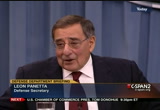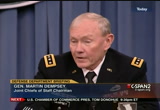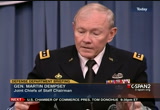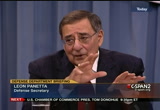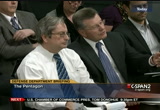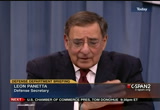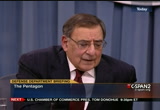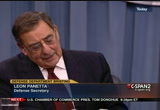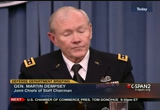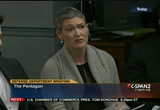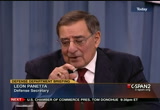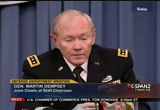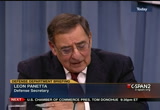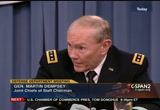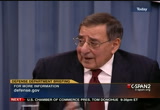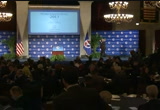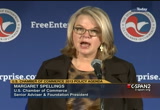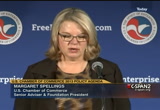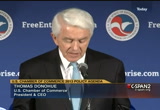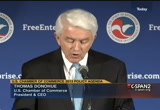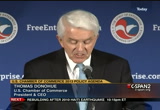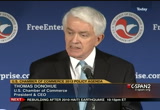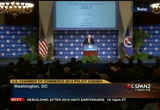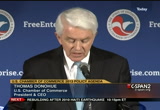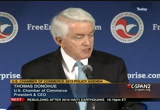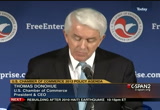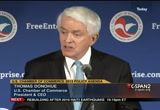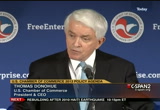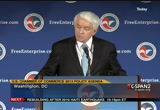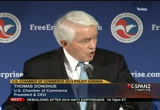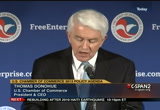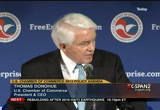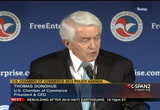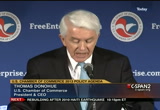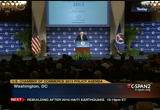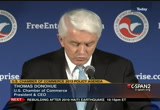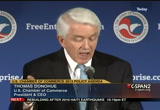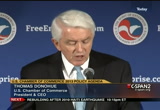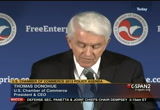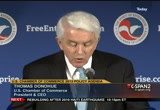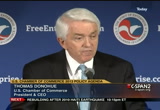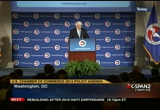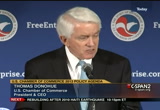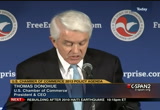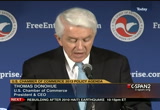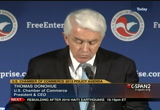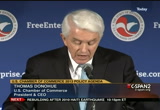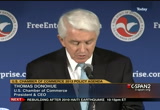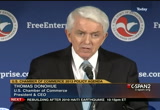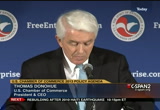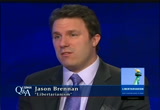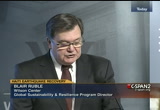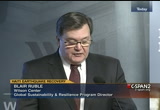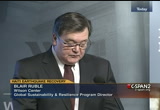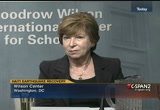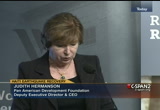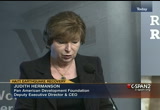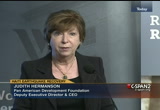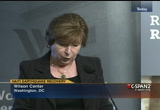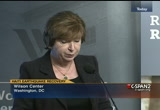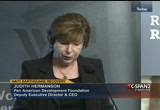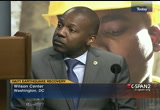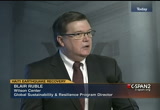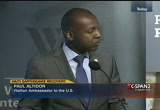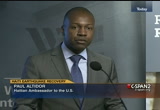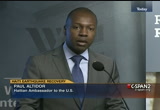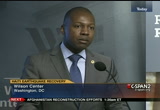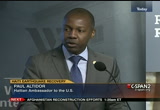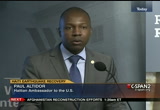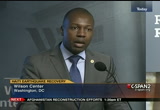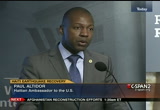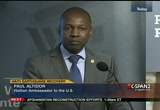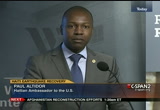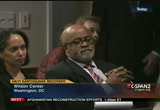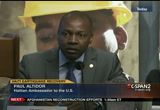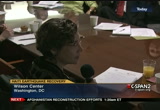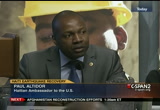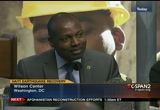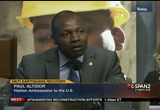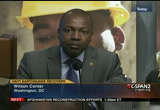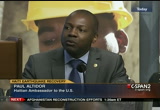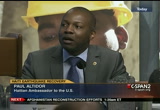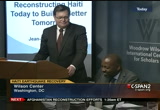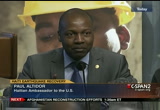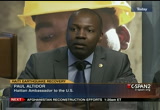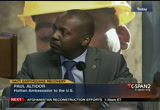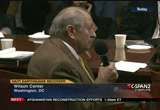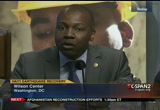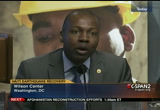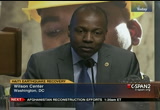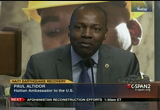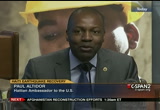tv Tonight From Washington CSPAN January 10, 2013 8:00pm-11:00pm EST
8:01 pm
>> thank you very much, and thank you very much for everyone showing up this afternoon. those were very generous comments and i am honored to be here today. at the stimson center, an institution named for and inspired by a man who helps guide the nation through some of the most difficult challenges that we have ever faced. and an organization that i remember calling upon for guidance and assistance on many occasions particularly when i was working for sam nun who i had the pleasure to work with for about 17 years. and i remember spending at the old office north of dupont circle many a day talking to bury and mike and the team of experts on proliferation issues, loose nukes, chemical and biological warfare issues.
8:02 pm
so it's a great institution and it's an honor to come back here. little did i know two months ago, approximately two months ago when we got together and talked about this, how good stimson was and it really is today i realized how good they are. two months ago when we picked this date, little did i know that it would be the week afghanistan -- that a certain president from a certain country would be in town. i remember conversations along the light of oh just going to be a formal gathering. just a few of us will get together and here i see c-span and that not of -- a lot of
8:03 pm
faces i see that i know both in and out of the government. i knew your background but i didn't know how good you were until today. all kidding aside, it is great to be here and talking about what really is a very important subject, no matter what day of the of the weekend wet week of the month or year it is. henry stimson reminded me a lot of sam nunn. like henry stimson, sam still does have a long and illustrious career in public surface but stimson did and he approached in the same way sam did and that is in a very classical and nonpartisan manner. i think mr. simpson, stick secretary stimson were alive today he would be taking the lead with his trademark judicious approach to the issues of afghanistan. he would be studying, he would be analyzing the challenges we now face in afghanistan.
8:04 pm
now he probably would speak this week are asked to take on the role of sigar. but i know henry stimson. in all seriousness, the position i was offered back in june as the special and spec or general for afghan reconstruction was both a challenge and an opportunity of a lifetime and it's one topic i'm excited to talk about and i'm cited to be here this afternoon to talk about her issues. the conflict in afghanistan is quite arguably our foremost foreign-policy issue and challenge facing us today. the united states has spent more money to rebuild afghanistan than it has been on the reconstruction of any other single nation, including germany, all in world war ii. in fact, we have spent about $28 million every day to rebuild and reconstruct afghanistan.
8:05 pm
nearly 90 plus billion we have already appropriated for afghanistan relief and reconstruction is designed to build and strengthen the afghan national security forces, promote self-governance and foster economic development. it is my job and the job of my nearly 200 auditors, investigators, inspectors and other professional staff to make certain that this money is spent wisely, effectively, efficiently and protected from waste, fraud and abuse. to help you understand the challenges we face at sigar and that my sister inspector inspecr general's face and their role as well is what our country faces in afghanistan, let me start by telling you a little story. a story about one of our inspection laws. in the far north of afghanistan, boring cushy c-span is cut news
8:06 pm
province. although initially one of the more peaceful parts of the country, in recent years conduits has seen an increase insurgent activity. it is also the site of a major nato supply run so maintaining security and safety of that province is critical to our national security interest. in 2008 fortunately the department of defense obligated over $70 million to construct an afghan national army garrison there that would house 1800 afghan national army troops and their advisers. this was a multi-building garrison. it was supposed to be completed in june of 2009 at within april 2010, it still was not completed. to make matters worse, the construction had been completed -- that had been completed had major problems. roofs were sagging or collapsing because the contractor had used
8:07 pm
improper welding and priming techniques. worse yet the sites were constructed on unstable soil and because the contractor did not adequately prepare the site and stabilize the soil and construct its proper foundation, the buildings were collapsed. they were literally sinking into the ground causing structural failure and making them unusable. in 2010, we inspected the sites. we found the province and we told the defense department to fix fix it. they promised to do so. however, last year we returned and we found the site in deplorable conditions. although some structures have been fixed, the underlying problems of the collapsible soil had not. as a result of the soil and stability, buildings had failed, holdings had sunk, holes had developed in more facilities faced the likelihood of
8:08 pm
structural failure. we saw gaping holes in buildings because of the structural failures, so large you could stick your arm through the sides of the walls of the buildings. the sinkholes were so bad that the transformers and electrical systems used to supply power to the facilities were about to collapse. moreover, even those facilities that didn't have deficiencies were not being used for the intended purpose, or not used at all. now like to report that the contract is responsible for this problem were held accountable. but that is not the case. instead, finding time and time again for some inexplicable reason, which they still haven't been able to provide an occasion for, the defense department released the contractor from all
8:09 pm
further obligations under the contract, including all warranties to fix all the problems and pay the contractor in full. now i tell you this story not because i think the reconstruction effort in afghanistan will rise or fall, defeat or fail with what happens in one army garrison base in one small province in afghanistan. the reason i am telling you the this story is because it's indicative of problems we face and we find time and time and again when we do audits and inspections in afghanistan. and the problems that we found at kunduz are indicative of larger problems and indicative of poor causes of the problems we have found in afghanistan and that is what i want to talk to you about today.
8:10 pm
excuse me. these problems, these core issues can be boiled down to five separate but interrelated issues. first inadequate planning, second poor quality assurance, third, poor security, fourth, questionable sustainability and lastly, corruption. let's talk about inadequate planning. we are at risk now of wasting billions of dollars if the agencies charged with implementing new programs and constructing new facilities do not first answer some basic questions. now i have been in washington for 30 some years. i almost fell off the stage. [laughter] i came from ohio.
8:11 pm
and maybe i keep this midwestern approach to issues, the basic simple questions that you would ask if you are buying a house, buying a car or trying to lecture your daughter on what school to go to. simple questions, logical questions. these questions aren't being asked or i should say aren't being answered in afghanistan. questions such as are these programs and buildings needed? have you asked the afghans if they want them? have you coordinated with any of the other organizations working for either the u.s. government or the international community? have we designed them to meet any specific needs that the afghans have? and have we designed them in such a way that they can be sustainable in the future?
8:12 pm
quite often, we find the answers to these questions are no. for example, when we asked the government officials why they had built the garrison in kunduz and how they discern the location and the way it was built, we got blank stares. there was no plan or justification documents that could provide these answers. in fact, as we reported in 2011 and another report, the department of defense did not have a long-range construction plan for its entire $11.4 billion construction program. now, just so you don't think were picking on dod, a.i.d. is no better. as far as we can tell, they have a hard time grasping what they constructed and even where they are located. and i would ask you to go to our web site in the next month or
8:13 pm
two and you are going to see an interesting audit and the findings i believe are going to be, we are missing a number of buildings that we thought we had dealt in afghanistan. i don't know where they went, but they be they were never built. the second issue that we are facing has to do with quality assurance. it is our job at sigar to conduct oversight of the reconstruction effort, but it is also the responsibility of the agencies, the implementing agencies, to monitor the progress and to do the due diligence before you turn them over to the afghans -- government. we are unfortunately finding that agencies often, often fail to fully implement their quality assurance programs. let's go back to the kunduz garrison. we found that quality assurance
8:14 pm
process was virtually nonexistent during the first nine months of the project. the most critical nine-month. as a result there was no way to verify if improper materials were substituted or if foundations were constructed with any type of quality assurance. we have seen this problem in the areas in afghanistan from development programs to capacity building initiatives to building construction. one of the worst examples unfortunately that we uncovered they have resulted in the loss of american servicemen. that involved a multi-million dollar program intended to protect highway culverts from improvised explosive devices. we filed that no quality control was done and as i reported recently in a letter i sent to the commanders in the field in
8:15 pm
an emergency management letter, many of the greats were missing. many of the greats were poorly installed in such a way that they failed to prevent ieds from being put underneath the highways. they have resulted in the death of u.s. coalition afghan forces. now this matter is still ongoing and it has grown in scope. i have got to give credit to general allen and many of the military officers who brought this to our attention because they thought it was localized. but we have since found out this may be widespread throughout the country. we don't know what the ultimate resort -- results are and it has turned into a criminal investigation. the third problem i want to focus on has to do with security and the key issue that we are
8:16 pm
facing. because without adequate security, reconstruction either comes to a hault or if it continues, it does so without the necessary oversight. the point in fact we were told the reason there have been no oversight in the first nine months at kunduz was because of the security situation there, that nobody felt it was safe enough to visit the site. this problem is not limited just to the united states. for example we know that the world bank has failed to properly monitor some of its programs such as the afghanistan reconstruction trust fund, because it has determined that sending personnel outside of kabul is too risky. as the military draws down, we too find that there are fewer places that we can go to safely in afghanistan to monitor projects. just last week, some of the inspectors who identified the
8:17 pm
problems and kunduz reported to me that they were unable to travel to a number of sites to inspect because of the security situation. we are working to find ways around this. it's not insurmountable but it's difficult because the best oversight is an american who is trained in oversight out there. we are trying to design systems that can take that into consideration we are hoping that the government agencies will contract to build and create these programs to do the same thing. if anything this problem could grow over the years to come. the fourth problem area deals with sustainability. by this i mean do the afghans have the financial and technical capabilities and the will, the political will, to operate and maintain the facilities and the
8:18 pm
programs that reconstruction has worked on as we have done in reconstruction over the last 10 years. the numbers tell a story. the afghan government brings in total revenues per year of only $2 billion. it will cost approximately $4 billion just to sustain the afghan security forces. now if you bring in the rest of the afghan government programs, we are talking about approximately 10 more billion dollars a year. that's a financial problem that the international community is stepping up to the plate to help the afghan economy with. as we recently reported there are other issues. the technical capability of the afghan government is in question. and we have found that the afghan government will likely be
8:19 pm
incapable of fully sustaining facilities for the afghan national security forces after the 2014 ambition and that includes that infamous kunduz army garrison-based. moreover, the afghan national security forces, and we have shown in another audit, lack the technical skills needed to operate and maintain critical facilities such as the water supply, wastewater treatment and power generation. finally, there is the problem of corruption. corruption in afghanistan is corrosive, being away at its reputation in the world and that the fate of the afghan people and their leaders, government programs and policies. according to transparency international, anna stanice perceived as having the worst public corruption, worst public corruption in the world tied
8:20 pm
with those favorites north korea and -- but corruption is not just an afghan problem. through our investigative work and our audit work we have uncovered schemes by contractors of and u.s. government officials who engage in bribery, theft and other forms of fraud. is it is too soon for us to know whether the problems and kunduz were the result of rivalry or corruption. our criminal agents are looking at that right now. but we need to acknowledge the role that corruption plays in undermining the overall reconstruction efforts and the credibility of u.s. and afghan efforts now and in the foreseeable future, even after the drawdown of u.s. troops in 2014. now i have laid out what we see is some of the biggest problems facing reconstruction.
8:21 pm
i don't want to sound pessimistic. [laughter] i am actually a very optimistic guy. that is why it took the job. i want to talk about how we at sigar and how the u.s. government is going to address those issues and why sigar is actually unique and has a unique position to really make an impact on the problems that i just identify. now first of all just so you know, sigar is the only agency in the entire united states government, my little 200 person outfit is the only agency that has just one sole mission, to protect and promote the effectiveness of reconstruction in afghanistan. we only have one and that's good because we can focus our
8:22 pm
attention solely on that important mission. although sigar cigars a temporary agency, there's a possibility we will be around after the 2014 troop drawdown. sigar is the only agency that has given the authority empowered by congress to look at projects across government lines. we are not limited like they aig, inspector general aid program, the state or dod. we are specifically instructed by congress to look across the government. if you do reconstruction in afghanistan ,-com,-com ma we can look at that program. we also have unique hiring authority. in essence everyone who works for me works at will so i can
8:23 pm
hire and also remove employees based upon specific needs and need requirements. all of our employees have to sign up for the possibility of working in afghanistan. so it's a unique crowd that we bring. we also have as a result the single largest oversight presence of any u.s. government agency in afghanistan. we have approximately 60 people on the ground right now including the largest cadre of auditors and criminal investigators, more than any other ig, more than any other fbi but it's not just her size in our mandate or unique authorities that is important. it's how we and how i view our mission and how are agency views our mission. when i joined sigar, i made it clear on the first day i got
8:24 pm
there that you should view this as a mission calm, not as a job. if you view this as a job, if you view it as a place to retire and play, you should leave because i only want people and it's a term i use, with fire in the valley because belly because we have a limited amount of time to do good in reconstruction in afghanistan. i abuse that fire in the belly speech so much that my chief of staff has coined a new term called 50 fire in the belly. aphis be memos and you know something, it worked. i am proud of my 200 agent auditors and investigators because they all have that ire in the belly. they could work elsewhere elsewhere. they are working in conditions as bad as our military is in
8:25 pm
afghanistan but many of them are housed in the same facility. there are men and women, but they take that mission because they believe in it and that's the difference with sigar. that is why it makes a difference. now, i also told them that we are going to be fair, we are going to be aggressive but we are going to be relevant and we are going to do it quickly. because says the security issue changes there, we are going to make a difference, we have to do it soon. this means we are going to employ traditional ig methods but we are not going to stop there. instead we are going to explore new innovative ways of conducting oversight. some examples of those are that we have the most aggressive suspension and debarment per-gram in the inspector general community. we have recommended 206 entities and individuals for suspension and debarment since this program is launched, far more than any other government agency in
8:26 pm
afghanistan. this has included 43 individual companies identified as having actively supported insurgent groups. now unfortunately not every agency in the u.s. government has the same prior developments are many times when we prefer companies or individuals for suspension and debarment those referrals are not acted on expeditiously and as quickly as we want. so we have proposed granting sigar or the theater commanders independent suspension and debarment authority that could allow us to get rid of that year's. we are also working more closely than any other law enforcement agency with the afghan police and prosecutors to get afghans charged, tried and convicted in afghan courts for bribery and corruption. now remember, in afghanistan
8:27 pm
unlike in iraq, where u.s. contractors were predominant, the u.s. government promoted its afghan first initiative, which emphasized prioritizing contracts with afghan owned and operated and operated company's. that is why in order to fulfill our mission of combating fraud in many cases we need to work through the afghan law enforcement and legal system when we uncover criminal activity. that is a challenge, but it has paid dividends. just recently for example, cut it provident and it -- individual was convicted and sentenced to two years in jail after sigar agents went undercover and taped him offering bribes. another thing i told my staff on the first day of work was that we have to be relevant by
8:28 pm
approaching our work like i did when i was an attorney. obviously there is no attorney-client relationship but we have to view the people who use our reports and our investigation as our client. if what we produce is not used by the commander in the field or the state department or a.i.d. administrators, then we have failed. they are our clients. if our audits are not relevant to congress, the congressional committees who are our clients, for them making decisions on appropriations or authorizations, then we have failed. my criminal investigators produce investigations that the department of justice does not take -- than we have failed. though i emphasize to them, if you have to produce reports and
8:29 pm
you have to produce investigations that are useful to them. the first thing i did, within a month i went to in the stand and talk to the ambassadors. went around talk to the state department defense department spend a lot of time up in the hills talking to the various congressional committees and their staff, one of which is here today. where is he? about what they needed and what we were doing or not doing to support them in their mission. i hope and i think we have succeeded. you know, the other thing i did that may have appeared odd plus i also reached out to another client. that is the academic and think-tank community.
8:30 pm
we don't have all the answers and that is one of the reasons why he came here to talk at stimpson and i've talked to people around the country. you see, if we -- at the experts think we are doing the right thing in our audits and investigations in our targets in afghanistan -- and that is why i'm here today to talk to many of you. we have sigar need to get our job right. my team and i are committed to ensuring that taxpayer dollars are spent wisely and are protected from waste, fraud and abuse. if we don't get it right, the mad treasure we have spent over the last 11 years will have been wasted. now that is something and i can give you a commitment today.
8:31 pm
i and my staff will do everything in our power to ensure it does not happen. thank you very much and i look forward to answering any questions. [applause] b-52 somebody have a question? if not, i will leave. >> dave and eikenberry huffington post. in the past decade we have seen all sorts of accounts of strengths and weaknesses of governmengovernmen t relying on the private sector both for security and that just takes and development work. my question is going forward ,-com,-com ma nobody envisions that government won't be relying on them in the future for future contingency operations. what are your thoughts on
8:32 pm
ensuring the best effective accountability and oversight in the future. a couple of years ago stuart bowen at your sister agency made a recommendation for across cabinet, cross-agency permanent agency that would do that. i don't know if you think that's a good idea or a bad comic about what thoughts would you offer to achieve that focus? >> i think that's a good question and i don't know if i agree -- would agree with stewart's suggestion of setting up a permanent entity. i think he made that suggestion before afghanistan and sigar. i actually am a strong believer in the special ig. with stewart has done and the powers i was given, i think there is one other special ig.
8:33 pm
sigtarp is the only other special ig. congress in its infinite wisdom actually gave us tremendous authority, tremendous powers. if you look at the legislation for the regular ig and compare it with stewart bowen's legislation in mind, i mean you trip over the term independent. i think it's mentioned 15 times in the first couple of paragraphs. we are so independent, but we can get the job done and we are given greater authority for hiring and firing. we go out and we are triggered by -- i think that's a good approach. you come in, you grow and when the problem and to go way. that is why i disagree with
8:34 pm
stewart's proposal. congress and i think you're going to hear from some of it in this year's defense authorization act. they came up with a different approach. you know, that was another approach i think to create the ig in charge. i just personally maybe haven't been in a special ig and i'm happy with the powers that i got. if you get the money fast enough and you get the leadership fast enough comcast the special ig approaches the way to handle contingency operations. yes, or? >> thank you very much. i am founder of -- international. thank you. i wish we had better news on afghanistan. a question. stuart bowen wrote a very good book with many good reports.
8:35 pm
and one wonders comp cohead usaid and the department of defense really with the lessons of iraq when it comes to afghanistan today. talking to my friends at integrity watch in afghanistan, one gets the impression things are getting worse, cannot better. your opening certainly sounded like that but i would like your opinion, stepping back a bit and talking about those two agencies in terms of a major role. thank you. >> you know, i have only been there for six months. i've spent my whole life doing oversight and accountability, but i have basically focused on afghanistan for six months so i'm not as good an expert is probably some people in this room. i am impressed by dod, and i think their response to some of the problems that were
8:36 pm
identified in iraq, but i am particularly impressed with task force 2010, general longo who runs that is fantastic. that was set up to deal with the contracting problems and i think the lessons learned in iraq. many people i have dealt with, number of task forces were set up and we have worked very closely with all of them. i am not certain a.i.d. got the message. now, but it's too early to tell. you know, where you may all think it's going to and in 2014, but there is reconstruction budget coming along afterwards so there's going to be a lot of time to tell. actually we are looking at it as we want to make certain there is a plan for the new contingency and the security situation.
8:37 pm
but, again i'm not an expert but i have been extremely impressed with the commanders on the ground and how they take security -- not security, but they take contracts and staff so seriously. i have to say i am going to be meeting him shortly, general allen has been one of my best friends and their agencies best friends in afghanistan on supporting our mission, and embedding us with troops. you accomplish so much when that happens, and i don't want to dwell on the question. let me give you an example also of not just a general core level. you get down to the local commanders. we have actually seen a difference come could depending on which reserve unit shows up but the commander of the unit
8:38 pm
shows up on one of the forward operating bases and takes contracting a use step seriously. if he doesn't talk to my people, if he doesn't really care and andy just punches his ticket, problems galore. so it really matters if they take it serious and i'm glad you asked that question and i hope i have answered it. yes, serve. >> bovbjerg and i was the founding director at a.i.d.. i think we are on the same side. what i'm wondering about is whether the abuses of contracting, particularly in light of a.i.d.'s on findings that there are only three capable government i'd -- that they have identified in
8:39 pm
afghanistan means that holbrooke's was flawed and for the panel the question is in vietnam, two-thirds of the development initiatives there were found after the board not to have specified outcomes and development impacts in the planning. and that led in part to such disappointment on the hill that the foreign aid act was voted down in the senate in 74. do you think findings like the inspector general has found are going to be so serious on the hill that it endangers the entire thing? >> we should wait until the other panel can discuss the rest of that. i don't know what's going to happen and the response to the problems we have identified. i don't know if that is a good answer to that question. [inaudible]
8:40 pm
you know, there are pros and cons with the approach towards local contracting. i can understand where they were coming from on that but let me go back to what i said in the beginning. i come from the midwest and i ask simple questions. we have got to be able to ask the questions, does our decision on whatever we are doing their, does that mean our national security and redevelopment objective? the second question you have to ask is, do the afghans want its? the third question is, can they -- do they actually need it and the fourth question you want to ask is, can they sustain its? and whether it's designing a program of contracting afghan first contracting or building a base for coming up with the program framing judges.
8:41 pm
i think you have to ask those questions. those are simple questions. it's not rocket science. oversight investigation is not rocket science. i used to teach at american university and i used to teach a lot of courses to cops and prosecutors. this isn't rocket science, and i don't know of age if age should be rocket science. i am very impressed with some people i talk to at a.i.d. has said we really need to design programs knowing where we are working. if we know we are working in the most corrupt country in the world we designed a program that protects the funding. i was very impressed with that. now i haven't seen a program without built-in but people tell me they are thinking about it. somebody told me that her regions do that. yes, circ? >> previously i ran a team for
8:42 pm
operations under dod to afghanistan. one of the things that i came away with is that afghanistan, afghans are good at running their own businesses. but what we do is we create an incentive whereby running business is about short-term profit. so what we have didn't, is partner with afghan, several afghans over there and we are trying to build electricity infrastructure were afghans actually have a stake in the infrastructure itself rather than just jobs today and maybe the americans come back and fixx it later. so i was just wondering what your perspectives are on where you see this kind of model and have you seen this kind of model deployed when it comes to building infrastructure in afghanistan? >> the simple answer is no, and
8:43 pm
we just did a report, actually we have done a number of audits on the afghan electrical grid and i think the most recent we just did a couple of weeks ago if i am not mistaken. again this is the problem and we need to ask a simple question. it's a great idea for the afghans to install meters so that they can build -- bill for the electricielectrici ty used. the problem is we borrowed 10 or $15 million worth of meters that are sitting in a warehouse. no one talk to the afghans. the afghans have no technical capabilities to install the meter so what did we do? we went out and bought more meters. so that's unfortunate. i think the same thing i have seen, we did an audit, one of the first audits when i came in on the afghan infrastructure
8:44 pm
program. a lot of that were big-ticket items that have to do with the bridging agreement and again it was a situation where we didn't talk to the afghans. we didn't coordinate with the afghans. we didn't coordinate with in this case, we didn't coordinate with the eight development bank. and they poured millions of dollars into programs. so the answer is, and again i'm not saying there are programs like that. i haven't run across one yet. i would love to. like that in our region, i would love to meet them and see how they designed eight programs. it's a learning experience to me. yes, circ? >> my name is adam and i'm a grad student at american university. i just had a quick question. i know you are you're also investigating criminal activity
8:45 pm
inside of that -- afghanistan and you spoke previously about how you crack down on the. it is anything like that going on inside of the united states in terms of buying previous afghan officials who may have been suspected of corruption, for instance the former -- and is suspected of corruption and those activities. is there anything going on inside of the united states as far as cracking down on afghan officials? >> first of all i can't discuss any ongoing investigations but i don't know anything specifically about the things you mentioned. i can't discuss any ongoing investigation anyway. number two, we deal with facts come kobe deal with evidence. wherever that takes us we follow. i cite that example because we are unique working in afghanistan but we also have indictments and investigations,
8:46 pm
criminal destinations going on here in the united states. we just arrested and convicted a senior enlisted man for taking bribes. it was one of the courts here in the united states. as a matter fact we have a very unique approach to. actually have a my own prosecutor on my staff. i paid their salaries, that callous said roe, special inspector general. as well as dual nationals and other individuals. i don't want to comment on any but there's a lot of speculation out there and that is good for newspaper articles and the press but i have to deal with facts. i have to deal with you know, evidence. that is difficult to get because a lot of my evidence is in afghanistan and the afghan citizen who are third-party
8:47 pm
nationals, so it's very difficult. i'm not saying it's easy. if it was easy anybody could do at, but it's something we are doing and we are doing it here in the united states on certain individuals. yes, circ? >> it's one thing to -- first of all thank you for confirming all of my worst expectations. [laughter] auditing the building and infrastructure in that kind of thing is one thing but a lot of u.s. taxpayer money is being spent on more traditional development programs that deal with partner capacity building, institution building, democratization. do you have a strategy for how to audit the effectiveness of those investments? >> we do. actually, we produced under my
8:48 pm
watch the first joint strategy for doing audits and investigations in fact area of afghanistan with the a.i.d. ig and estate ig. and we have that document. it lays out a strategy. where we are focusing on the most important programs like dollar amount impact on our mission. it's a 50 page strategy. which i must say, it wasn't until i showed up that we finally got the joint strategy. we have been spending money there for eight years before, 10 years before. how do we target -- which i think is good to do. in the way that. >> and neshell in ashley in
8:49 pm
terms of reconstruction efforts in afghanistan you outlined a pretty bleak situation. what do you think it takes to improve that situation and what role do you see her office playing in that? the second would be all the problems you outlined, what's the civic agencies to hold responsible for those issues flex. >> you know, i don't hold any particular agency responsible. security is an issue. corruption is an issue. i think every agency in the u.s. government has to do more, has to do a better job. has to think about those questions i posed. i'm not pointing to any particular agency. which is the worst or which is the most important? >> initially you outlined a bleak situation going to take to
8:50 pm
improve that and what role do you see your office taking in that? >> well, i think our role is in now as an inspector general for afghanistan and, i don't do policy. i don't design and make the policy. i see how well it's carried out. so i think the policymakers need to read the reports, cut talk to the agencies and make a determination if they are to go in and are proceeding in the right direction on the funding. and i think that is our world. our continuing role will be to find people who are stealing. we will try to prosecute them either in afghanistan courts or in u.s. courts. we will identify problems with programs and give advice to
8:51 pm
congress and the other clients as to how to improve those. but that will be our role. it's the policymakers who have to take the information i produce and the gao produces and the other igs produce and synthesize that into how is that going to impact our programs? i see i'm getting the hook. >> that's a great answer. i think we are going to move onto the panel. this q&a could go on for two more hours. we brought someone of high interest who gave a very interesting discussion. thank you so much for coming. please join me in thanking him. [applause] >> thank you very much. [inaudible conversations]
8:52 pm
>> afghans could read the president smooths, unlike anyone else. he came as close as anyone to gaining admittance into what robert sherwood called roosevelts heavily forested interior. unlike mrs. roosevelt, he knew when to be still in the presence of the president, when to press him or when to back off and tell a joke. after he won the election wendell willkie who he beat was in his office comp then they remained friends. wilkie said to the president,
8:53 pm
cut why do you keep that man so close to you? batman being hopkins. wilkie did not like hopkins and roosevelroosevel t said you know, hume may be in this office some day and you'll understand. he asks for nothing except to serve me. today defense secretary leon panetta said his department is preparing for budget cuts if congress doesn't act on the sequester. automatic spending cuts that would remove $500 billion from the defense budget. secretary panetta was joined by joint chiefs of staff chairman martin dempsey at this 45 minute pentagon briefing. >> earlier today, i was pleased to welcome president karzai to
8:54 pm
the pentagon, along with his delegation from afghanistan. including minister of defense mohammad. i had long, i think it was an hour-long, one-on-one meeting with president karzai at. we have the opportunity to discuss the ongoing transition to afghan security lead as well as the commitment of the united states to afghanistan, the enduring commitment after the completion of the transition by the end of 2014. i think, you know, is fair to say that we made some very good progress on all of the key issues that we discussed. our meeting i believe will help lay the groundwork for president karzai's discussions tomorrow
8:55 pm
with president obama president obama on these and other topics. president karzai and i believe very strongly that general allen's plan that was adopted in chicago by nato is working and we are we are fully committed to vanishing the job. i also assured the president that my successor, secretary of defense, will be equally committed to working with him and achieving the goal of an independent and strong afghanistan. on that note again i want to commend president obama and his decision to nominate chuck hagel to be the next secretary of defense. i have known chuck for a long time. i think he is the right person to lead the department at this time. not only because he is a decorated yet mom combat veteran, but he understands washington and understands the
8:56 pm
issues that confront our national defense. despite a lot of very severe budget pressures which i will speak to in a moment's, we need to maintain, and i believe he believes we need to maintain the world's most powerful and ready force to deal with the security challenges that we are going to confront in the 21st century. this is a critical moment for this department. and for our national defense. i believe that we have put in place a new defense strategy for the 21st century that we believe can meet our fiscal responsibilities to the country. that can confront any threat to our national interests, and i can maintain the strongest military power in the world to
8:57 pm
protect the american people. we face, as you know, a number of adversaries around the world's,, but the most immediate threat to our ability to achieve our mission is fiscal uncertainty. not knowing what our budget will be, not knowing if our budget will be drastically cut, and not knowing whether the strategy that we have put in place can survive. let me be clear, cut this department is doing its part to help confront the nation's deficit trouble him. we have implemented in our budget plan the $487 billion in spending reductions that we were
8:58 pm
asked to do by the congress over the next decade. and we can, and we are doing this by virtue of the broader strategy we have put in place. wheats lined a strategy and we know what the elements of that strategy are. we built a budget based on that and we achieved our savings by virtue of that strategy. as i have said repeatedly, if we face additional meat axe cuts as a result of sequestration in, it will seriously threaten our ability to implement that strategy. the fiscal cliff deal has delayed sequestration from taking effect until march 1, but
8:59 pm
that is now less than 50 days away. while we appreciate the fact that both parties came together to delay a sequester, the unfortunate thing is that a sequester itself in the sequester threat was not removed. so the prospect of that happening again is undermining our ability to responsibly manage this department in the current fiscal year. indeed, we are seeing the formation of what i would call a perfect storm with budget uncertainty. ..
9:00 pm
9:01 pm
through the year, our overall operating accounts would increase by 5% although the proposed budget resented by the president for a 2013 budget. that amount roughly comes to about $11 billion that would come out of o&m. an important part of our new defense strategy is to increase operating accounts in order to maintain readiness, that the c.r. is simply extended with prevent us from doing that. secondly, if congress does two d. trigger sequestration and we have this massive half trillion dollars cut that goes into effect on march 1st, we would have to cut in this fiscal year another 9%, almost $18 million from o&m and operating accounts as well. lastly, to protect funding for the war in afghanistan, we have
9:02 pm
an obligation to protect the war fighter and protect what we're doing in the war in afghanistan. we would have to again cut another 5%, another $11 billion from readiness money available in the active-duty base budget and more for the army and marine corps. so if you take the total sum of these cuts, we're looking at 19% to 20% reduction in the base budget operating dollars for active units, including what looks like a cut of almost 30% for the army. the net result would be some very sharp cut backs in training for a unit that are not deploying to afghanistan. we're going to protect not only the units in afghanistan, but those about to deploy to
9:03 pm
afghanistan. does not apply to afghanistan would obviously see some very serious cutbacks. you would meet reductions in ship training, except for a highest priority unit, reduction in flying hours in pilot training and just it have to be pulled out of maintenance and disruptions to almost every weapons modernization and research program. for the civilian workforce, the cuts would require them to be subject to further, which would further harm our readiness and create hardship on them and their families. any word, we would you force to do what i said we should not do with the defense budget, which is to hollow out the defense force of the nation. to try there for an prepare for
9:04 pm
all of this uncertainty and the extraordinary budget uncertainty we are comforted team, the leadership of the department has decided that it must begin to take steps in the coming weeks that would reduce potential damage that we would face should congress fail to act to prevent the cuts i talked about. regardless of what congress does or fails to do, we still have an obligation to protect this country. so for that reason, i've asked the military services and the other components to immediately begin implementing prudent measures that will help mitigate our budget risk. for now, i think clear that these actions must be reversible
9:05 pm
to the extent feasible en masse to minimize harmful on readiness. but we really have no choice but to prepare for the worst. these actions should include having to curtail facility maintenance for non-mission critical activities, freezing civilian hiring, delaying certain contract awards along with other stat. in addition, i've directed components to develop more detailed plans for how they would implement sequestration if it's required because there will be so little time to respond in the current school year. i mean, were almost halfway through the fiscal year. this includes a plan to implement potential unpaid
9:06 pm
furlough's first civilian personnel to sequestration trigger. this action is simply precautionary. i want to make that clears precautionary, but i have an obligation to let congress know we may have to do that and i very much hope we will not have to furlough anyone. we've got to be prepared to do that if we face a situation. the purpose of the intensive planning method is to ensure that our military is prepared, including ability to successfully deter regression if necessary. i want to emphasize however no amount of planning that we do can fully offset the harm that would result from sequestration if that happens. i understand. i really do understand how
9:07 pm
difficult the politics are on capitol hill to confront and try to resolve this very serious fiscal crisis that this country is in. but all of us in washington, all of us in washington have a responsibility to the american people to provide for national security and keep them safe. so whatever the political differences, we cannot allow our brave men and women in uniform to be put in risk. they are fighting and dying and working every day to keep this nation safe. those of us in washing 10 need to have this encouraged as they do to do the right thing and try to protect the security of this country. we must ensure we have the resources we need to defend the nation and meet commitments to the troops, to civilian ploys
9:08 pm
after more than a decade of work. the simple fact, the simple fact is that this fiscal uncertainty has become a very serious threat to our national security. and like any grave threat that we face, the american people expect and deserve action. congressman is passed a balanced deficit reduction plan, trigger sequestered and pass the appropriations bills for fy 13. i'm committed to do whatever i can in the time i have remaining to work with the congress to do what is necessary to resolve these issues. we have a vital mission to perform, when the american people expect and are entitled to come which is to protect safety and national security.
9:09 pm
congress must be a partner in that mission. i'd love to be able to do this alone, but i can't. >> thanks, mr. secretary. like the secretary, i am very concerned our elected leaders are able to satisfy sequestration during the last congress. postponing sequestration doesn't prevent it. it just prolongs uncertainty for our force and military families. as i said before, sequestration is a self-inflicted wound on national security. it's an irresponsible way to manage our nations defense. it cuts blindly and will play. it compounds risk in a compound's readiness, compromises readiness. readiness is now is in jeopardy. on the brink of creating a hollow force. the very thing we said we must
9:10 pm
avoid due to the unprecedented convergence of factors mentioned by the secretary. sequestration will hit over under a revolution, implementing the cuts made in the budget control act and still fighting a war in afghanistan. anyone of these would be a serious challenge on its own. together they set conditions for readiness to passed the tipping went as early as march. we won't shortchange those who continue to research those ready to deploy. it would be unconscionable to do otherwise. likewise, will continue to care for wounded warriors and families. for the rest of the force, operations, maintenance and training will be guided. ground aircraft to return ships and sharply curtail training across the force. as the secretary mentioned, we may be forced to further
9:11 pm
civilians of maintenance and health care. we'll be unable to reset the force following a decade of war. our readiness to begin troop road. within months, will be less prepared. within a year, will be unprepared. the crisis can and must be avoided. the sooner the better. we need to choose certainty. we need time to absorb the budget reductions. we need flexibility to manage those reductions across the entire budget. we have none of these things right now and without them we have no choice but to steel ourselves for the consequences. thank you. >> mr. secretary, the number of troops the u.s. of afghanistan after 2014. a couple days ago the white house came out and said the president is open to the idea of keeping our troops in afghanistan after 2014.
9:12 pm
given your description of the longer-term u.s. objectives in afghanistan of car terrorism and further training of afghan forces, is there a realistic option? >> obviously we want to accomplish the mission we agreed to in chicago, but as to what those numbers are, we provided some assessments to the white house, but we have is this moment not presented any of the options to the president, nor has the president made a decision. so i'm not going to sit here and speculate as to what somebody said or what has been speculated to in the press. all i can tell you is we have presented options to the white house. ultimately we hope the opportunity to present those options to the president. >> the wait has said since here was an option. i wondered whether you had given some thought as to how realistic
9:13 pm
that might be. >> you know, we've said from the start that no option is entirely off the table. the react to requests on a certain set of parameters. with the mission, was requirement to protect the force while accomplishing the mission over what period of time. as the secretary said can we provided options not to president, the national security staff. as you know, i don't speak about options until it had a chance to speak to the president himself. i'm not prepared to say anymore than that. i'm not prepared to say anymore than that. >> mr. secretary, i've been rereading basically after 11 years the insurgency is still
9:14 pm
strong and we can generate tax and corruption throughout the forest. the ansf is not ready to take over. have you asked for another year, 18 months or more that kind of sense unless? >> we have ported a lot of blood and treasure in this war over the last 10 years. but the fact is we have also made a lot of progress as a result of the sacrifices that have been made were not going to work backward from what has been accomplished. we have seriously weakened the taliban. you know, the two remain resilient. we know they're still out there, but we've been able to take the battle to the taliban and prevent them from getting any territory they lost and we're
9:15 pm
continuing to do that. we are seeing a ansf and afghan military that is increasingly important its ability to be operational. we've gone through a transition areas and above of a 75% of the population of afghanistan and those transitions are working, moving in the right direction and it is the ansf providing the security with regards to all of these areas. in addition to that, we have and removing the fourth tranche in next year will implement the final tranche in this transition. so progress is being made. progress is being made on the battlefield. progress is being made with regards to the society in afghanistan. the house arab afghans is
9:16 pm
improving. is it everything we want? note. is it everything that we would hope they would be able to achieve in this timeframe? not yet. but we are moving in the right direction and i think over these next two years we really have the opportunity to build up to us in the right place to complete this mission. the gas can see it that way and we are not going to walk away from the sacrifices made over the last 10 years. >> your hope of political and name? >> i think the stronger decision we taken showing that we are going to continue to complete this mission, the better the chances we have to ultimately achieve political reconciliation.
9:17 pm
>> during a discussion at president karzai, one whether he made it clear he would like american troops to remain in this country after 2014 and whether he's fully prepared to provide the immunity from prosecution, which is a problem in iraq. >> again, we had a very good discussion on all those issues. i don't want to prejudge but ultimately president karzai and president obama will state with regards to the discussions. but i will say this, but i was very satisfied with the discussions i had with president karzai. he indicated a willingness to be able to do what they believe is necessary in order for us to accomplish what we agreed to in chicago and that's what counts.
9:18 pm
>> sequestration question for you. >> and research? >> prudent measures he talked about. today include canceling ship maintenance and grounds maintenance, curtailing conferences, training ongoing? >> yes. >> is this an indication that throwing the towel and sequestration is going to happen? >> i'd like to believe that ultimately the congress will do the right thing. but the problem is this, but i thought plastered to sequestration was so not that there was any chance of it happening. undersold frankly there's not a member of congress that didn't take sequestration was the wrong thing and it shouldn't have been. but the longer they delay dealing with it and the fact is
9:19 pm
they been implemented h. c.r. an incentive to sequestered in a budget deal, they simply delete it and now are facing it again march 1st and frankly my fear in talking to members of congress is that, you know, this issue may now be in a very difficult place in terms of their willingness to confront what needs to be done to trigger sequestered. for all those reasons, plus sa said the insurgency of what could have been on the debt ceiling, if you put all that together, we cannot set back and be prepared for the worst in us were trying to do. >> having been a service chief
9:20 pm
come up with a mechanism and sequestration is established, we would have to absorb $52 billion in reductions piece of the started in october commutes are fixed to the number 12 months. in january europe's or 52 billion over nine months. in the start of march commutes 2 billion over six months or seven minutes. the permits and sustainable way to take measures to prepare ourselves for that eventuality. >> the fy 13 budget, were basically spending money pursuant to what we had in the fy 13 budget. and the fact is spending at this level and effort required to do this cut, suddenly we achieve this level of savings. where do we go? are going to protect the war fighter commits us in afghanistan. are going to protect this area
9:21 pm
is critical to national defense. so where do you go? u2 readiness, maintenance, training. this is where cuts are ultimately made. when that happens, it makes us less ready. >> $45 billion, not 52. >> it is an old number. >> actually, you're not correcting me because i am right. >> over the broad conclusions you came to have the officer corps lost its way with the comments in your memo trickery that. >> first of all, i hope you realize this has been a passion of mine since i actually did a thesis when i was a major fort leavenworth, kansas. so the decision to take this review is something that i found to be timely and also necessary
9:22 pm
after 10 years of war and 20 years since they've actually done this comprehensive review of our profession. were not done with conclusions yet. but i want you to know is the secretary has allowed the joint chiefs of staff to seize the issue, to make it their own, to do their own assessment. we tell him a report. a confident we will find there thinks he can do ourselves and our own authority, but there will be policy issues passed to the secretary for his decision. if you want to know where we are today coit has several tank sessions. i spoke with academics, kind of decided were going to present the initiatives to be pursued in forbearance, training, education, support to senior leaders and development and
9:23 pm
development might be the place where we find the big ideas if you will about what we need to do. but we're working at it will get something to the secretary of defense as his successor is confirmed before he leaves the job. >> mr. secretary, first of all on immediate or cautionary steps reducing on mission sending a commit a free freeze on civilian hiring a contract, is there a dollar amount on not, on the amount of money you'd be saving? >> but i've asked all the services to do at our budget you guys to look at all these different pieces until they would ultimately can we say by virtue of the steps. i can't give you a number now. but what i said is we got to do
9:24 pm
everything we can to achieve whatever savings we can in the immediate future to be better prepared for what we may face. >> i'll tell you right now to look at the billions of dollars we are looking at, will have to squeeze awfully hard to be able to prevent any damage from taking place. were born to suffer some damage. >> the suspect to you, tony. first of 52, not 45? sequestration was delayed by paying for it to be delayed. 2 billion this year, 4 billion next year. it was that we will delay it and then reduce it. we are to pay the price for it being delayed. >> you personally have decades of service in washington giving any ministrations and given us a white house of staff, during some of the most contentious political times as you well know, between the administration and capitol hill, just so the
9:25 pm
clinton in congress managed to get the nations worked on. what's going on today? what is so different about the political atmosphere here in washington today as the time he served. >> you know, during the time i worked in the congress and served in the congress and was involved in past administrations, governing this could politics. if you cover the nation, solve the problems, take the risk in order to do his challenges out there, in the end, we felt it was good politics. when we do with reagan as president and bush as president, a democratic congress coming speakers at the time felt if we could work out agreements with the president, that even though
9:26 pm
the republican president would benefit from a democratic congress would benefit a slow period for whatever reason, that concept has lost and i think there is an attitude that governing is that necessarily a good politics. that gridlock and confrontation is good politics. and i think we pay a price for that and that's what's happening. >> mr. secretary, can show us about your meeting with your successor? and a discussed in transition. there's been reporting about his views on the pentagon budget. it's inclined for deeper cuts, did he speak to you about his intention? >> we've had the opportunity to have lunch, are actually had dinner and talked about kind of just the general issues confronting the defense
9:27 pm
department. and then we had a lunch that frankly specifically focused on the budget challenges were just describing to you. i think my impression is that, you know, he understands the challenges and i think i am confident that he wants to do everything possible to try to deal with the challenges they face. as to specific feelings on different issues, i'll let him speak to that finance his confirmation hearing. >> just to follow for senator hagel, one of the recent concerns on the hill prepositions on nuclear issues and this time not about this advocating for reductions. it's a concern of yours that is going to implement the administration's current policy? >> there's no question in my mind. i've known chuck hagel for a long time. a lot of criticisms right now are unfair, but have opportunity
9:28 pm
to speak to those on his confirmation hearing and i think in these battles, and his confirmation battles, there's a lot of charges out there come a criticisms out there, but ultimately the truth prevails and the truth in this case will mean that hobe conference. >> i wonder if you could talk a little bit about the meetings that the afghans today. they've been concerned with long-term getting more aircraft and other equipment for their military. there has been some reporting about the ability to do that. were you able to talk with them about that? is there any more clarity about other equipment for them? >> that was one of the discussions they made and again, i don't want to speak to but ultimately will be announced later, but i think it's fair to
9:29 pm
9:30 pm
strategic review and from that will come, it seems to us, will come a view of how to move from they are today. which is clearly focus on counterinsurgency to something they may wish to become in the future. >> a lot of times the israel prime minister, the defense prime minister was in town shortly there after we started hearing concerns about syrian chemical weapons and -- [inaudible] made some form. and then about a week or so later you said that the threat seemed to have been put on the back burner. what is your view right now? has it changed and, general dempsey, you think there's anything militarily to stop the syrians from using chemical weapons? >> you know, i think right now the bigger concern that nodes to be focused on is assuming assad comes down and, you know, i
9:31 pm
think there's a stronger likelihood that could happen. how do we secure the sites in what do we do to deal with that situation? and that is a discretion that we are having, not only with the israelis but with other countries in the region to try to look at you know what steps need to be taken in order to make sure that the -- sites are secured and they don't wind up in the wrong hands. i think the greater concern right now is what steps does the international community take to make sure that, you know, when assad comes down, there's a process and a procedure to ensure that we get our hands on securing those sites. that, i think, is the bigger
9:32 pm
challenge right now. -- [inaudible] what happens in a transition is there a permissive atmosphere or hostile atmosphere? that will tell you a lot. >> want to talk about the czech republic being egger to help with training the rebels in another cup. is that something that is being looked out? >> yeah, actually the czechs have a very capable, we could call it in this country chemical biological nuclear capability, over time in collaboration with us as a nato partner, we are in contact with partners who have the capability. we have done assessments that might take against the various environments that the secretary mentioned. and we're engaged -- i've told you, we're engaged in planning
9:33 pm
to develop options against alternative futures. alternative future one collaboration or permissiveness all of which would have different requirements. >> you talk now possibility of training rebels -- >> i haven't heard that. that's not a request we've head. i don't know if they would have don't that request through some other channel. [inaudible] >> we're not working on options that involve boots on on the ground with, you know, i think you have to keep the possibility that if there is a peaceful transition and international organizations get involved they might ask for tax in that situation. but in a hostile situation, we're not planning for that. >> back to general dempsey, i asked whether there was
9:34 pm
militarily anything there was the u.s. could do to stop the assad regime from using chemical weapons. >> the act of preventing the use of chemical weapons wash almost unachievable, jennifer, you have to have such clarity of intelligence, you know, persistent surveillance. you would have to see it before it happened. that's unlikely, to be sure. on the other hand, you know, our collaboration with regional partners, turkey, israel, i talked to my counter part yesterday, jordan. we have a planning element in jordon. messaging such as our president for the use of chemical weapons those responsible would be held accountable. i think syria must understand by now that the use of chemical weapons is unacceptable. to that extend, it provides a value. but preventing if t, if they decide to use it i think we would be reacting. >> expire after sixty days?
9:35 pm
>> that's with the scientist tell us. i still would be reluctant to handle it myself. >> on afghanistan a lot of questions. the state department sitting in today did they plan to have keep open an embassy in afghanistan in light of what happened in benghazi and after speaking with president karzai today. what sort of u.s. military troops, equipment do you expect to have to provide to protect those american civilians who may be in afghanistan in 2014? >> you know, as we always do around the world, if the state department has requirements they think are important in order to provide security, we'll do what we can to meet the requirement. that would be the case in afghanistan. >> thank you very much. [inaudible conversations]
9:36 pm
next on c-span2 the president and u.s. chamber of commerce gives the annual state of the business address. and efforts to rebuild haiti after the 2010 earthquake. and later the inspector general overseeing afghanistan reconstruction talking about how aid dollars are being spent and misspent there. ♪ hollywood's most famous movie star to help the government sell war bonds.
9:37 pm
-- from the 1940. how was it presented in comic books from the 1940s? how was it presented in athletic event from the 1930s and '450s? how was it presented in fin can ally. >> this weekend on american history tv. purdue university professor lectures in history saturday night at 8:00 and 10:00 eastern. on c-span3. u.s. chamber of commerce president thomas donahue talked fiscal issues and the need to address the national debt. the remarking part of the state of american business address. it's thirty five minutes. [inaudible conversations] >> good morning. happy new year, everybody. i'm margaret spellings, president of the u.s. of chamber of commerce foundation. we're pleased you could join us
9:38 pm
today for the annual state of american business address. before we welcome him to the stage i would like to say a brief word about our friend. looking pass over the past year the chamber had a share of victory and a few goinlt during the economically politically devicive time under tom's leadership. they pursued a proactive, positive, and bipartisan agenda to grow our economy and put americans back to work. and in the collaboration and comprise are all too rare, he reap psz out to leaders from both sides of the aisle. with where there is common ground, he's been willing to work with groups who have interest in constituencies don't always align with ours. when it's come under attack, tom has tirelessly made the case for free imriedz and forly advocate for what had calls the greatist economic system. and when others argue that
9:39 pm
america's best days behind us and citizens and leaders not up to the challenges before us, tom cause them out. 2013, marks tom's fifteen year here. every year it becomes increasingly clear and amazingly impressive for those who work for him that he doesn't ever slow down. he doesn't scale back, he doesn't rest. he doesn't stop challenging himself and all of us to do more and to do it better. but today isn't looking back. it's about looking ahead. what we can and must do to make america a stronger and more prosperous country. his leadership style is reflected in the culture and i know it will be reflected in our agenda in 2013. without further delay. please join me in welcoming the u.s. chamber of congress president, tom donahue.
9:40 pm
[applause] so you upped the pressure. ladies and gentlemen, thank you for joining us. margaret, i appreciate your comments, i will get even at the later dead date. i'd like to thank the national chamber foundation and their staff and our colleagues for putting this meeting together and for all the effort they put in to this important day. as many of you know, we like to begin a new year by looking how american business is doing. discussing the key challenges facing our economy, and by identifying the top priorities the chamber plans to work on. in some important respects, the state of american business continues to slowly improve. we believe the economy will grow
9:41 pm
throughout the year and not fall in back in to another recession. the chamber is forecasting growth of one and a half to one and three quarters% for the first half of the year, gradually accelerating to two and a half percent by the end of the year. on the positive side, housing is continuing to improve. europe seems to be stablizing, and energy prices are steady. big companies at home and abroad are flush with cash and looking for reasons to invest. on the negative side, the recent tax increases resulting from the fiscal cliff deal will hit successful small businesses hard, which will dampen growth and hurt job creation in the first part of the year. as illustrated by the chamber's latest survey of small business members, there is a -- which you should have at your places, there is significant uncertainty
9:42 pm
over health care, regulations, taxes, and deficits. last week's jobs report was mediocre. only 63% of our eligible work force is even participating, and we don't see much improvement in unemployment through the year. so while our economy may be growing, it is fragile growth and not nearly strong enough to create jobs americans need or to expand their incomes. and now, we face a series of new washington deadlines over the deficit spending, the debt ceiling, sequestration, and a continuing resolution to keep the government running. we also face another domestic and international uncertainties that have the potential to drive
9:43 pm
down confidence and discourage job creation, from a regulatory flood here at home, to economic problems in europe and japan, to geopolitical conflicts that could erupt in to war at any time we must also be concerned about america's capacity for leadership and action and not only in government. in this country, and this is a country that can still big things done, do we have the leaders with the courage to put the country first, ahead of their own careers, politics, ideologies, and egg goes? can we find leaders in government who truly appreciate the role that the private sector can and must play in building a new american prosperity.
9:44 pm
the imperative economic growth should not be an afterthought. it should be job one. economic growth must be front and center here in washington just as it is in many state capitols across the nation lead by innovative governors from both political parties. today 23 million americans are unemployed, under employed, or have stopped looking for work. a record 47 million people are poor enough to be on food stamps. median family incomes have dropped to 1995 levels, so we're going back ward. millions of new college graduates, many of them deeply in debt, can't find promising positions in their fields. what is happening to the american dream for them? we see despair in our urban
9:45 pm
areas where up to 50% of our young people don't even graduate from high school. we need to build an economy that gives them hope too. from top to bottom, we need more success in america. we need to nurture success, empower it, reward it, and celebrate it. this is why the chamber will advance the american jobs and growth agenda this emperor. the overriding objective this ambitious plan is to generate stronger economic growth in order to create jobs, lift incomes, and expand opportunity for all americans. we are null belie aware that economic growth alone cannot solve all of our problems. but without growth, we will not be able to solve any of them. our plantains many proposals and
9:46 pm
reforms, which we will be discussing and advocating all yearlong. but in a short time that we have today, i'd like to highlight five key issues: producing more american energy, expanding american trade, modernizing our regulatory system, reforming immigration and visa policies, and addressing the fiscal crisis with a bold plan that slows the growth of spending, reforms entitlements, and overhauls our tax code. let me begin with a fiscal crisis. because the next battles over our nation's fiscal condition have already begun. as i mentioned, congress in the administration are soon to face new critical deadlines around the debt ceiling, sequestration, and the need to fund government
9:47 pm
operations. these deadlines will mean uncertainty for our economy, our businesses, and for our financial markets at home and abroad. as they address these deadlines, policy makers must seize the opportunity to make real progress in the areas they neglected in the first fiscal cliff. first and foremost, that means controlling deficit spending through common sense, entitlement reform. the last debt ceiling increase was passed in august of 2011. that was a 2.1 trillion dollar commitment. here we are seventeen months later and $2.1 trillion is gone. kaput. and now we need another
9:48 pm
increase. how much longer can this kind of spending go on without adjustment? as a nation, we must finally face up to the single biggest threat to our economic future, and that is our exploding national debt driven by runway deficit spending, changing demographics, and unsustainable entitlements. if we fail to address this threat, automatic spending will soon consume every dollar the federal government collects, leaving nothing for education, national defense, or other essential programs. we have no illusions that putting our country on a surround and responsible fiscal course will be easy. it clearly will not. our government is divide and conflicted because the american people are divided and conflict ed.
9:49 pm
we cannot ignore this crisis any longer. nor can our leaders. as important as economic growth is, we can't grow our way out of this problem, and we certainly can't tax our way out. we must address is the fundamental realty that due to our aging society and increased life expectancy, the entitlement programs written and designed for an earlier era must be revised. we're not talking about cut in absolute terms, we're simply talking about slowing the rate of increase. this can be arrived -- achieved with reasonable adjustments phased in over a number of years. comprehensive tax reform is another essential part of the solution to our fiscal crisis. the right kind of tax reform will makes more competitive across the globe and empower our
9:50 pm
businesses, small and large, here at home. the right kind of tax reform will turbo-charge our growth, create jobs, and generate more revenues for government at all levels. but make no mistake, while there are solid, economic and competitive reasons to pursue, tax reform cannot be seen as a substitute for spend restrain. our spending problem must be addressed before or concurrently with comprehensive tax reform. let me say a word now about energy. now and all last fall, the chamber talked about how fortunate we are in the united states to have a third bucket to draw from to address our deficit and debt. the first bucket is spending. we've been talking about it.
9:51 pm
entitlement spending, defense spending. the second bucket is revenues. and the third intuct energy. -- if you have to depend on just those two buckets,tist it's going to be a long difficult day. so we need a third bucket. and it's energy. which is the next priority i'd like to discuss. proceeding swiftly and responsibly to develop more american energy can help us immeasurably with our fiscal problems, but it can also do much more for our country. we have more oil, gas, and coal than any other country and we're now the largest single natural gas producer in the world. we're now in a position to export lick with a fied natural gas and coal, and thus reduce our trade deficit and bring
9:52 pm
billions of dollars to the united states. the abuns of a affordable natural gas is attracting -- attracting good manufacturing jobs back to america. particularly in the chemical and steel industry. all of this adds up to a lot of jobs, growth, improved national security, and more revenues for government. according to the person real yum substitute, oil and gas companies already account for 9.2% of all -- $9.2 million american jobs and pump more than $500 billion in to our economy. it's just the beginning. over the next twenty years, energy can create millions and millions of additional jo jobs, spread out across the country. in the last few years alone, shale activity has created 1.75 million jobs. between now and 2035, we can
9:53 pm
double shale economic impact, double the number of jobs and generate accumulative $2.5 trillion in new government revenues. to achieve these benefits, we need to safely open up new land for expiration. with -- exploration. we are foolishly locking away too much resource off the coast that we should have access to. we need a predictable and fair regulatorily environment. the federal government shouldn't pick the winners and losers or subject them to reviews. such roadblocks have stimmied the keystone pipeline. it must be built. we shouldn't stop -- we should -- shouldn't have said that way. was getting wound up little bit. we should stop epa senseless and
9:54 pm
aid logically driven battle to ban the production and use of coal. we should couldn't with -- continue with the next generation of nuclear power plants and shows waste no time in pursuing research to develop alternative sources such as wind, solar, goo owe they are man, and deficiency. that's where we have lead the world. by fully embracing america's energy opportunity, he accelerate growth, create millions of new jobs, free ourself from less than stable global suppliers, and create huge new revenue for government, which, will help reduce our budget deficits. we also have an extraordinary opportunity to create growth and jobs through expansion of trade and investment and tourism. small and large businesses say they really can't create a lot
9:55 pm
more jobs without a lot more customers. 95% of the people that are potential commerce live outside the united states. and we need to sell them something. that's why a bold trade agenda will also be a major priority for the chamber in 2013. we need to conclude the transpacific partnership agreement in the booming pacific basin. let's get a high quality agreement and let's get it done this year. the chamber is also been leading the fight for a trade agreement with the european union. we're gaining a lot of support for it from business and government on both sides of the atlantic, negotiations should be launched without delay. in agree knee have a fifty countries have stated their intelligence to launch talk on an international agreement to
9:56 pm
boost trade and services. let's make sure it includes robust protection of intellectual property. the chamber's global intellectual property center will don't lead at home abroad to protect ip and the millions and millions of high paid quality jobs it supports. our country should also make a major effort to attract more global investments. foreign investment already directly or indirectly supports 21 million jobs. we'll take more investment. we need a lower investment in these barrier at home to attract
9:57 pm
more business and visitors and investors and tourists. we should negotiate more by -- bilateral treaties to ensure that american investors are treated fairly overseas. now here's another big issue for us. we need to address the coming flood of new regulations that will discourage our job creators and damage our competitive edge in the global economy. when you consider all the new rules now pouring through the regulatory pipeline and those still to come, it's staggering. the dodd-frank financial law mandates 477 new rules and regulators have only finalized a third of them. the center for capital market will advance an agenda to
9:58 pm
preserve the first sources of capital for our nation's job creators by seeking fixes to those areas of dodd-frank that the congress and regulators simply got wrong. we will promote additional reforms in area where congress has not yet acted and we will seek to replace areas of dodd-frank that do not work and do not achieve their objective. major epa rules imposed over the last decade cost more than $23 billion and a new ozone regulation, listen to this, if implemented could cost american business $90 billion. if epa moves forward with rules on greenhouse gas emissions, and applies them beyond power plants and refineries with it could ensnare roughly 6 million facilities in burdensome permitting requirement. the regulatory flood appears to
9:59 pm
be particularly pronounced in the health care unit. the new rules and mandates in the health care law not to mention the extraordinary confusion businesses are facing as they try to comply to drive costs through the roof and in many cases, cause americans to lose the health care coverage that have been accustom to we need do three certainly things. to build a big reason is the months and even years and years that it may take to get a permit. second we need to modernize our
10:00 pm
regulatory system to bring more accountability to the regulators and restore the role of congress in the rulemaking process. the bipartisan regulatory accountability act, which passed the house last year, would accomplish these things and help ensure that rules are based on good data and some science. are third you're going to see a us significantly expand the the expertise of our law firm, the national chamber litigation center. and in other areas of our institution in order to deal with expanded regulations. our preferences is always to work within the -- we do that on a daily basis but when rights have been trampled on, our regulators have overstepped their bounds?
10:01 pm
well, we'll just take necessary and legal action. now let me turn to something we should all care about in a very important way. and that's immigration reform. america has grown and thrived because we have attracted and welcomed the most talented and hardest working citizens of the world to our shores. immigrants teach in our universities, they invest and invent in the technology companies, they staff our hospitals, they care for our elderly, and our young, they harvest our food and serve in our armed forces. given our changing demographics, we need more workers to sustain our chip, support our population and help us stay competitive. even with high unemployment. we are millions and millions of job opens that go unfilled either the work is come here to
10:02 pm
fill those jobs, or the companies will take those jobs and others that go with them elsewhere. some argue we should do a better job of educating training and putting our own people to work. damn right we should. that's why the business community is fighting hard to school and job training reform. and it's why we are especially proud of our hiring the heroes program, which aims to apply and assistant skills of our soldiers returning from the battle field. since the launch of this effort in march of 2011, we held 387 hiring facer for veterans and military spouses. more than 14,000 direct jobs have been created and tens of thousandses of others that we don't know about. and many more placements are to
10:03 pm
come. we still need immigrants. we are locked in a global competition for the world's best talent. this is the competition that will separate the economic leaders from the laggers in the 21st century. the chamber is already teaming up with -- listen to this, labor unions, faith organizations, and ethics groups and more enforcement to build a coalition for comprehensive immigration reform. we believe immigration reform should include the following and i'll be quick. we need to secure our borders. everybody knows that and it's imperative people in commerce flow efficiently and lawfully through our ports and across our borders. in addition, our laws must be revised to welcome needed labor and talent in to our economy
10:04 pm
through thoughtfully designed guest worker programs. this includes provisional visas, for skill work -- and expanded cap for high skilled visa and expanding green cards where appropriate for foreign nationals who graduate from our colleges and universities with advanced degrees. we also need a workable, reliable, national employee vertification system. and we need provide a path out of the shadows for 11 million undocumented immigrants who live in the united states today, provided they meet reasonable conditions. as we have this important debate, let's remember who we are and where our families would be today if earlyier generations of americans had decided to slam the door shut.
10:05 pm
the door to the american dream must always remain open. now, ladies and gentlemen, before concluding, let me underscore there are other significant priorities i haven't discussed today. but they are vitally important and we will be working hard on them all year. our substitute for legal reform will continue the fight against litigation on the state and local level and on the international front where people are going to sue american companies. legal reform has linked to economic development and jobs that are very important way. our work force freedom initiative will encourage efforts in the states to maintain flexible and fair work force rules. to adapt the right to work loses where appropriate and pass seriously underfunded public
10:06 pm
employee pension and benefit systems. we're going redouble our effort to make the economic and mauro case for reforming our public cases and overhauling or job training programs. every child, every young person and every worker in america deserves the opportunity to succeed and millions in our country don't have that chance. the chamber is working with other and conducting an -- to ex-up and down the best manufacturing system in the world. and manufacturing jobs to bring them here to america. and you'll see us advancing this important initiative as the year goes on. and anyone who knows me or the chamber knows we're deeply
10:07 pm
committed to rebuilding america's infrastructure. we don't expand our infrastructure and make it more efficient and seemless, we can't grow our economy and i remember that every day as i drive to work and bump my way along the washington streets. congress and the president took some positive steps last year and we have to build on that in 2013. we all know the information technology is a critical tart of -- critical part of infrastructure. america needs robust as well as cybersecurity protections. to protect our public safety, to guard against disruptions to business operations, and utility service and present the -- prevent the loss of capital and intellectual property. we will continue to urge congress to pass consensus-or subsequented cybersecurity legislation that will truly
10:08 pm
enhance business' effort to deflect and defeat cyberthreats and work closely with our government get it done. so ladies and gentlemen, let me conclude where i began. by underscoring the fundamental importance of economic growth. we must get this economy moving faster. growth of one and a half or percent is simply not acceptable. it won't produce jobs. america needs the revenues the government must have to reduce trillions and trillions of dollars of deficits. congress and the administration must focus their attention on this critical priority. every bill that is considered, every regulation that is written, every negotiation that is held, everything our elected and appointed officials do or say must be shaped in large part by these simple questions.
10:09 pm
what does it mean for jobs? what does it mean for growth? do avance our job and growth agenda, the chamber will continue to strengthen and improve i.t. as an organization and as an influential force and as a powerful brand at home and around the world. we will, of course, expand our grassroots networking of small businesses. free enterprise advocate and federations of chamber and industry groups. while gearing up and refreshing our political program for the next election cycle. we're going deep our bench of experts and communicators and of lawyers to prevail in the battles of policy ideas to reach new audiences with a message of economic opportunity and to win courtroom victory and regulatory
10:10 pm
relief. in the difficult environment of divided government, we stand ready to work with both parties. and within both parties, with the administration and with both traditional allies and adversaries, whenever and whenever we can find agreement. but we will not sugar coat or shy away from the disagreement that will inevidently arise. we're going passionately defend the right of business community and all americans to speak freely and participate in the political and public affairs of our democracy without fear, without intimidation, without undue regulation. and we will intensify our efforts to educate and explain the workings and the principles
10:11 pm
of american free enterprise to citizens and government leaders. including the fundamental values of risk, of profit within of individual initiative, and of limited government. these values benefit all in a free society. business is not the problem. it's business that creates jobs, high quality, well-paying jobs, and jobs and businesses are the solution. our leaders in government need tow understand this. we cannot afford smallness in our policies. when the nation really needs big solutions. so the chamber will proudly and vigorously represent the american business community and all of the great debates that lie ahead. but we will reject narrow
10:12 pm
agendas whenever they come from and put the country first. we call upon all american leaders in and out of government to do the same. the chamber will stand squarely with those who do. thank you very much, ladies and gentlemen. [applause] friday on washington journal, business round table president john i think leer on the fiscal cliff deal reached in congress and the upcardiologisting budget dealgt that away them. and emily's list president looks at the increasing number of women in congress and how to could affect political and social issues in the future.
10:13 pm
if you ask questions like if you give people a batter of questions about different ideological things, do you believe in x or y and then you track those to different ideology, then depending which poll you're looking at you get up to maybe 30% of americans who call themselves libertarian. if you ask the following question, are you economically conservative but socially liberal? you get over half of americans calling themselves saying that's what they from. now, that said, just because people say them it doesn't mean they believe them. if you ask most americans do you want smaller government.
10:14 pm
they say yes. you want government to spend less then you ask them to cut economy item. they don't want to cut anything. it's not clear if they really believe in it. based on what i have bringing the book, roughly somewhere as low as 10% and as high as 30%. libertarians if they were akind of conscious and political, they could be a big movement. they could be -- it could be a big group of people who have shared ideology and have a lot of influence in politics. for various reasons they're not organized that way. you're watching c-span2 with politics and public affairs.uarn
10:15 pm
earthquake struck southern haiti causing severe damage and killing over 300,000 people. a panel including haiti's ambassador to the u.s. assessed the recovery effort of the past three years. from the wilson center in washington, it's three hours. >> welcome to the wilson center. my name blair ruble and i'm director of the program on global sustainability. i'd like to welcome you to the center on behalf of our director, president, and ceo jane hair month. hair blank blng we have had the pleasure of partnering for today's effort with the pan american development foundation on behalf of everybody, i would
10:16 pm
like to welcome you. this weekend on january 12th, we will have the first -- third anniversary of the 2010 haitian earthquake. a disaster which was devastating every possible way for haiti, for the haitian people and a disaster which has tested the capacity of the international community to respond. great deal has written and said about what happened in haiti since 2010, indeed just a few weeks ago on christmas eve, "the new york times" published an article assessing the response to the earthquake under the headline "rebuilding and haiti's lags after billions and post earthquake aid." this anniversary, i hope, provides an opportunity to have
10:17 pm
perhaps more thoughtful assessment of what has happened and what hasn't happened. what is going wrong, but also what is going right. then we might find in a newspaper headline. it is an important opportunity for not only the haitian people, but for the many people in the international community who have engaged in earthquake relief to stop a moment and consider what happened, what hasn't happened, what the challenges are ahead, what we know better now about how to respond. and we hope that this small event will be one way of prompting that larger conversation. and that? general the anniversary will give us a moment to pause and reflect.
10:18 pm
i'm going to turn the floor over to judith for an additional note of welcome. i'm not going to say a lot about her biography. you have a biography of the speakers. we have worked with judith over the years on a number of different projects, and it's always been great working with her and we were excited when she came to us with the copy with haiti. she held a number of positions. among many of her distinction
10:19 pm
she's a graduate of smith college. and i say that because jane, our president is a graduate of smith as i gathered. there's now a great interest in smith college at the wilson center. and smith graduates. so judith. >> thank you. it's great to be here. i would like to add my words to those of blair a warm welcome extended to you. thank you for coming to what i think and hope will be a productive series of discussions at this important historical moment. my great thanks also to the woodrow wilson center for cohosting this event with us and for their collaboration. mutual admiration society, it is always a pleasure to work with you blair, and with your great
10:20 pm
team. it is an exceptional opportunity to hold the dialogue as we look forward beyond reconstruction to renew l in haiti at the wilson center, because the wilson center is dedicatedded to open dialogue and actionable idea we hope we will bring fort both. the we look forward to hearing the perspective of the government of haiti, the united states, the region nam perspective of the organization of american states, which is very engaged in haiti. and the perspective civil society organizations implementing program on the ground and those that may -- and from all of you so we may advance these discussions. three years ago today, as blair reminded us, on saturday -- three years ago -- sorry not today. on saturday. a huge earthquake devastated haiti. and just to get us all on the
10:21 pm
same page. you read the numbers and know the statistic. the direction beyond imagining and an estimated port-au-prince almost $15 billion worth of damage. the earthquake jarred an already vulnerable economy and shook the government literally and figuratively to the foundation. we know from our own in united the encounter with mother nature hurricane sandy most recently it's not an easy task to recover from such natural cat fee. when you think about the magnitude and the huge earthquake of haiti it's not surprising that all has not gone as fast as everyone would have hoped. as "the new york times" article
10:22 pm
cited by blair and other publications have noted billions of aid was promised a the time of the earthquake and billions have been delivered. but some have not. is it the reason that reasons not quote, unquote fixed? i don't know. perhaps expectations were not expectly framed to begin with. i endorsed what blair was saying about this being a moment for reflection. because port-au-prince is in 2010 had established urban pattern already there was not a robust urban system and not able to keep pace with the huge growth over the past decade or more. and important physical ways pattern cannot be ignored nor has been the habit or preference of people who inabout this. so putting on the bask reconstruction the reconfiguration of an entire urban area may have been unrealistic but it's important ask what about moving forward? how does building back better
10:23 pm
fit in to that framework? certainly there are improved seismically techniques, employment, and income generation opportunity, skims, training, availability, opportunities for greater societal cohesion, through bottom up approaches with now policy to design to create employment. i will close by saying it's important to remember three times at this three-year anniversary. while much remains to be done, many important things have been accomplished. let us not fall to the trap of bemoaning what has not occurred a the the expense of celebrating what has. the challenge of reconstruction and renewable are not only geeing or construction
10:24 pm
problems. they are profoundly human problems. are crucial to building back better. padf has been working uninterpretly in haiti for thirty years and always in partnership with the people civil society, and government. on this third anniversary of the earthquake as we look forward an important look forward it is our continuing hope and i think that of haiti's many friends, many of you in the room here today in tribute to those who remain and honor of those who perished. that the better will include broader transformational initiative as well. we have deep faith that the resilience of the haitian people
10:25 pm
will prevail and their leadership and the nation's of the world will keep faith with them. and we pledge our assistance to the best of our abilities. thank you. >> i now have the pleasure of introducing ambassador paul alidor ambassador of haiti to the united states. it may sound strange to say this upfront. i want to know that the ambassador needs to leave at 10:15. nerve the room and c-span and the web watching this, if no statement when e leaves the room, and we're just honored he found the time to be here. ambassador is a native of haiti. he attended primary and secondary school in haiti before moving to boston where he completed his secondary education. he continued to complete the
10:26 pm
undergraduate degree at boston college to earn advanced degree from imt. he pursued graduate study at law and economic at the university of paris. i took particular note of this stage in his career because i had the pleasure of being a visiting lecturing at the geography laboratory in 2001, 2002. and i remember the experience, this is a university with a graduate program of extraordinary diversity, energy, and just really smart students. and i remember the experience every day that i had the pleasure of teaching there. walking out of the classroom thinking, this is a place full of people who will change the world. and now i see i was right.
10:27 pm
so i am very pleased to see evidence that my feelings. he's held a number of impressive positions and played a role in post earthquake relief through the association with m.i.t. and the clinton-bush haiti fund. he taught law and worked at banks. there are many distinction of the year and we're -- career and we're pleased to welcome him here to the wilson center. thank you, again for the introduction. let me take this opportunity to thank the woodrow wilson center the pam pam pan american development foundation for host today. it's with good pleasure i accept
10:28 pm
the invitation to be here today to discuss haiti with such an effort, and to present to you the government strategy to spur economic development. as you are all aware, over 200,000 people die during the earthquake. close to two million people instantly become displaced. over 80 percent of the school in port-au-prince, haiti's happen -- capital was destroyed including many universities. the government of haiti lost a quarter of its work force in port-au-prince alone. over 60% of buildings, government buildings were destroyed including key ministries. three years later, i'm pleased to say that significant progress has been made, significant progress is being made to ensure
10:29 pm
10:30 pm
1.5 million of these people have been relocated. gradually, public places in haiti are being vacated. the government will reduce the number of people to a combination of subsidies, division of new housing curb rehabilitation and support to individuals and families to encourage the return to origin. all of these actions are part of a long-term housing strategy, put in place by the government in partnership with the ngos and members of the international community. what is the key aspects of the strategy is that the government no longer wants to build temporary shelters. we went to move on to permanent housing associations can hunt decent shelter to live in.
10:31 pm
we will continue to work with ngos, with our partners to ensure your that the policies being followed and implemented well. significant progress has also been made in terms of removing debris and fixing houses. over 70% of the debris has now been removed out of port-au-prince. more than 300,000 houses have been repaired. the government now is embarking on an ambitious project to rebuild some of the institutions. as of today, there are 42 of the government offices that are being rebuilt. as recently as last week, we started construction in port-au-prince. despite some of the successes, he deists of the still facing many challenges.
10:32 pm
that may perhaps point out those challenges. and there are many of them. first, there is a lack of coordination between the international community after it and not of the government. as a result, resources have been misallocated. as a result, too many duplication efforts. second, for too long, the more than 10,000 ngos operating in haiti today were not in some cases are still not been held accountable by heating or its people. that has to change. but the majority of assistance going to the ngos rather than haitians stayed with the haitian government committed haitian states have become weaker in many cases. in an effort to address the issue, the government currently has adopted a new coordination
10:33 pm
mechanism, which is designed to align the work of the ngos to the national development strategy and ensure that ngos coordinate initiatives with the government rather than bypassing the government. another challenge for facing is that sun may, of the billions of dollars pledged to haiti after the earthquake, only fraction of the money is being committed or dispersed in haiti. now he deists at a crossroads for galvanizing its endowment and sustainable, long-term economic growth. there are multiple development efforts currently underway, spurring economic growth. these include ambitious projects come the building of roads, building of two international airports, a new focus on energy,
10:34 pm
construction of a park, creation of financial mechanisms to ensure enterprises have access to finance that they can go and prosper. the government is absolutely focused on adjusting promotion needs. the issue of extreme poverty, increasing productivity and expanding involvement. this effort, i am pleased to say, has begun to yield some results. close to 1 million school-age children are now able to gain access to schooling thanks to subsidize tuition, preschool lunches and free transportation. with the next three years for hoping to have 15,000 new classrooms in partnership with friends in the international community and ngos to sell.
10:35 pm
currently there are two programs underway in to ensure they are being taken care of. significant steps have been taken to ensure we address issues in the judicial system. we know much-needed reform is needed to combat corruption among other things. in terms of the year, legislation has been introduced. we reduce the time it takes a business to actually start in haiti and operate. before closing, i think too highly of a nice way to the development process as ambassador to the united states. this has to do with haiti's foreign policy, which is taken a shift with it. now in this notion of diplomacy. by that, we mean using our
10:36 pm
embassies, ensuring that we are oriented our mission, and pairing our foreign mission to serve as a conduit, to serve and help investors come to haiti. our diplomatic mission around the rose your system is turning to encourage direct investment, to encourage open market for haitian products overseas, to support the interest of patient businesses and haitian entrepreneurs. in short, the government of haiti, the people of haiti are determined to get development right this time around. we are working tirelessly. we are committed to actually get it right and we will get it right. to this end, were reaching out to the international community
10:37 pm
to strengthen our relationship and mutual respect. we are certain or actually going in the right direction. i'm going to stop here. before moving on, i'd like to think the woodrow wilson center for offering me this opportunity to address some of you today. thank you. [applause] >> we have time for some questions. the floor is now open. in the very back. we will get you a microphone i think. >> thank you so much, ambassador. i am elise young of album and rice. i work for a couple years at action aid in the housing rights
10:38 pm
campaign. i was hoping you could address the housing situation. we saw the reasons to two states we still have around at think 350,000 living in idp camps i know this is obviously a major priority of the government and president martelli has put his plan in place. can you talk about the five-year plan and how is the government doing a better job of making sure that people living in the camps really have a voice in how they are relocated. >> thank you. >> i'm sorry, one more thing. especially when as well. >> thank you. i say stated in my comment, close to 1.8 million people were living under tents at the time
10:39 pm
the government took office. we've managed to relocate more than 1.5 million people. we are very aware of the fact that many more people and personally as an urban planner myself come into the last person was out of a tent as a haitian, i don't take anybody would be satisfied. the issue are facing is not just the earthquake issue. also addressing what he deists faced prior to the earthquake. that's why we're saying we don't want a lot of short-term solutions only to push the problem further down the road. so from that point of view, the strategy were looking at is to move people out of the tens away from public spaces. it's more than not. goes to a point to do a doable solution. some of its making certain people have access to housing.
10:40 pm
it means the government has houses numbly work with the ngo community. more importantly, people have access so they can actually pay for their own housing. all of these issues are the issues were addressing today to ensure the long-term solution to the pub and as opposed to temporary solutions today, only to resolve the same problem tomorrow again. said the housing deficit were addressing, not just caused by the earthquake, but the deficit prior to the earthquake. >> anything the government is doing, we are not doing this unilaterally. there are a number of factors involved in that process, with its community disorganization, ngos working in some other committee organization, working in partnership with the government in some other part others. from that point of view, are all
10:41 pm
the voices being heard? it's debatable. i do believe and i do know is involved in the process is a planner myself in the initial phase. i know which effort was made to ensure the voices are heard in some capacity. credit to many communities are actually working to be searching resources are being heard. >> thank you, ambassador. i marine taft broyles at the congressional research service. he mentioned the new date for naming committee. could you please explain what the composition of the committee is, but your relationship with donors are and how often the committee is meeting and what kind of a support structure they
10:42 pm
have two design and implement program so they can get some name following were quickly? >> sure. i made reference to the new mechanism. within that mechanism, there are some committees that will be involved. what i may suggest to you, we have a document be put in place. the new mechanism is the next step after the earthquake. so from that point of view i'd welcome the opportunity for those of you interested to reach out to the embassy. we can actually provide that information in greater detail to have the mechanism going to work. i encourage you to reach out the embassy implode on information. >> thank you very much for your presentation.
10:43 pm
i'm -- is this actually working because some of the challenges you have cited in terms of lack of donor coordination, duplication of effort, misallocated funds are not unique to haiti. as an outcome is very common in all sorts of environments. be interested to see if you can harness the donors to work and address your priorities. let me ask you if you could say a word or two about the security situation in haiti. security underlies importune for investment a novice can do things. recent major demonstrations. if you could say a word about that. thank you. >> i guess i want to serve at the last part. i am a policeman resent demonstrations. when it comes to developments in haiti, i usually argue the most
10:44 pm
critical challenge haiti is facing's and perception. when it comes to security, i think that's one of the major issues today. his haiti as i say that in most places you go to in the region are some cases in the u.s.? absolutely not. when something does happen in haiti, it gets magnified to a point where haiti becomes. the river shoes in haiti, just like washington d.c. where we are today. most of the issues are being addressed. at times they see security issues being addressed in the press. sometimes i think it's if. this week have been major issues of the timing of travel warnings, whether it's canada or the u.s. they created major issues for the government and people of haiti, not because of the travel
10:45 pm
per se, it's the perception that there's a way to language were said in the signal to people that wow, pdas are safe to travel to. but at the end of the day cometh significant bashers have been taken to ensure the security issues are being addressed. like i said earlier, things are not as perfect as a haitian, as ambassador. at the end of the day, beyond the perception, and beyond was being said, encourage you to look at the numbers, statistics. chances are there's a different story being told. the >> grade year. >> good morning. roger williams. i have a question for you.
10:46 pm
one of the things they don't care being addresses the need to create jobs in haiti. you look at the unemployment rate, the fact that folks are living on limited dollars each day, but she don't see a lot of industry and job training. the focus seems to be on housing. could you comment about what you're trying to do to bring much i'd see people living in haiti? >> thank you. first of all, the president in his development agenda talks about the five d's. in the development program has to do with employment and job creation and a key critical part of saying we try to take ownership of development, haiti, government is trying to take ownership because they're trying to decrease dependence on foreign aid and foreign
10:47 pm
assistance. to do that, we hope to put in place an environment where great economic opportunities can be created. for that to happen, these heavy focus on improving the business environment so that you creation can put in place. and now says they stated in my earlier comments, a number of mechanisms are looked at to ensure access to financing can go on prosper in haiti with the intent that folks cannot access, the sustainable job. at the end of the day, the fast forward from our point of view is not humanitarian assistance. it's a gift that can on giving. most haitians are not looking for handouts. most wanted job in the government, and the people of haiti at the end of the day with a can of partners have not played. again, the issue of perception.
10:48 pm
whenever people think of haiti, most of the time in the outside world, there's a d. the clever shifting gears a little bit. that's when you is to ensure the users as conduits to focus development to ensure that can attract investment in haiti. investment from the haitian community as well. >> i wanted to ask a question and ask you to answer this not as ambassador, but a city planner. when you think back to graduate seminars at m.i.t., what didn't your professors know that you now know? [laughter] from a theoretical point of view, most of which heating aid
10:49 pm
i don't think is that different from other places. but i think one significant thing different to in haiti and most of the places is the clichés. many times i see folks contentions from a planning point of view. there's an assumption that folks answer to haiti's problems with very little information, at times with little understanding of the haiti context. a lot of times people rebuild some name that's not broken before. so at times been telling people and from a small town. this is not by any stretch of the imagination -- [inaudible] right now people think when we take on a project, as a student that was early in the 80s.
10:50 pm
we are running a transportation system. but now, a lot of times people calm with the misunderstanding of what would run in haiti. to me between miscommunication between the lack of understanding of haiti's true history and context and what people need in haiti is creating major issues in terms of planning for the future. >> time for a couple more questions. one right here and then one here and we'll see where we are. >> thank you. of the inter-american foundation and i'm a returning to the topic of economic development. i was heartened to hear about the plan for job creation and focus on business and industry, but given 50% to 60% of patients either the partly from her mostly from agriculture, i wonder which he sees the role of
10:51 pm
agriculture being in terms of economic development and the role of small farmers. >> what the agricultural sector is key for any moving forward on a number of angles. one, given what we consume so this issue of security is a critical part of it. so now when you look at the whole absent. , from an economic development point of view, which i had to fill some of those gaps. that may give you some concrete examples. right now -- [inaudible] are most likely is in, to actually transfer of its products the most of it think it wasted at at the time in the market in port-au-prince. we hope most of the times they need investment capital.
10:52 pm
even at the smaller scale level, when we talk about investment, were not simply talking about millions of millions of dollars. small farmers and actually $10,000 on just to get the equipment so the balance can coincide. that's overseen in the humanitarian assistance to set the kidnap of a fine businesses out there it can partner with. a lot of templates and capital, to bring your knowledge of democracy a little bit. so from an economic point of view committee at victor's critical, not only to address security problems, but also in terms of job creation. but there's many that need to be filled. >> will take two questions. we have about five minutes.
10:53 pm
[inaudible] >> urban planner. i have a race question with respect to your answer about markets. the customs is an issue of getting the materials and supplies out of it. they seem to take a secondary role to the importation of the releasing from customs the items to the grocery stores and the high-end things. and yet, critical lab supplies are not getting through. is there any changes you foresee in the past process? >> there's a host of changes being taken. remember earlier nobody was
10:54 pm
satisfied with the process of how things are going. the way i usually tell people for not sprinting to the finish line. loretta point rainout were very dressing where great dressing a whole set of issues and that is part of addressing issues with respect to customs. some reforms are being taken to be certain we address them properly. again, we don't want to be in the business of short-term solution only to create more problems down the road. so there are issues of legislation and other stuff that we want to be sort are the foundation as opposed to simply looking at the superficial part of the issue. but this is one thing we know for certain that is critical to actually make certain goods are moved in a knot of the country fairly easily. part of coming to haiti, but also part of leading country and leaving haiti as well in a timely manner.
10:55 pm
>> to more questions here. >> good morning. my name is bob freed up from united states institute of peace. after hurricanes and they come at the united nations announced ever have a million people who were in danger of severe acute on nutrition and a million and a half total faced with starvation. then deserted disappeared from the press. i wondered on the earlier question of agriculture what actually is the situation in terms of food security. >> not good. at the same time, measures are being taken. one of the key aspects of 2013 is addressing the issue of watershed management in part because we know next is a new hurricane season is going to affect the agricultural site are
10:56 pm
again. from that point of view, from the ad sector addressing the issue of watershed management is a key priority in the agricultural sector in part to prevent the issue of security moving forward. >> thank you come ambassador. helen santiago with usaid. i'm curious as haiti grows into the future from an economic and resiliency to, could you speak a little about what you see as growth sectors in haiti as you are looking to encourage business in foreign direct investment and from the earth of climate change and geographic developments in the country, where d.c. prioritization for haiti? >> as far as growth sector, they are multiple. we are betting on a few of them and us as we were hoping to to gain the support of folks in the
10:57 pm
international community and the context of haiti. much is being said about the local investment the government is making in the tourism sector. again come the cliché of haiti as it is not a tourism destination. the level of poverty and everything else associated with haiti. guess i., as recently as the 1960s, haiti was one of the leading destinations in the region. and today, most turks working in haiti to meet and how that potential. that's why we're talking about taking ownership of developmental object is. we are convinced there are certain things we can do. the first in the region, in the world. there are many things that are rich culture weekend i'll. i think people will be attract
10:58 pm
it to what is happening in haiti if and only if we move beyond our perception of clichés. the tourism sector is finally put investment dollars in the government, working in partnership. so if you go away from port prints can you be surprised how many little businesses are flourishing in the hospitality sector for kids. one of the key site terms even in port-au-prince back of the many hotels in haiti. so from that point of view, whether it's the tourism sector, the agricultural or an agribusiness and so forth, the service economy is much is her talking about international aid, i don't think much credit is given to the local private sector on the ground. this on medium-sized businesses in the service economy. i mean, the medalist so saw people tend to forget it.
10:59 pm
but there is growing even further. school teachers, bankers,.areas, mechanics, folks who work as carpenters and many work as individual entrepreneurs. many of the businesses need investment capital. debt financing of campaigns equity financing. at the end of the day, all of these in a service economy and other surfers set to, opportunities and what they say to the investor community, come and see what were talking about. but come with a heart of being open-minded. haiti is not the destination people make it out to be. are people, entrepreneurs on the ground who are actually in need of capital. they are in need of good
123 Views
IN COLLECTIONS
CSPAN2 Television Archive
Television Archive  Television Archive News Search Service
Television Archive News Search Service 
Uploaded by TV Archive on

 Live Music Archive
Live Music Archive Librivox Free Audio
Librivox Free Audio Metropolitan Museum
Metropolitan Museum Cleveland Museum of Art
Cleveland Museum of Art Internet Arcade
Internet Arcade Console Living Room
Console Living Room Books to Borrow
Books to Borrow Open Library
Open Library TV News
TV News Understanding 9/11
Understanding 9/11